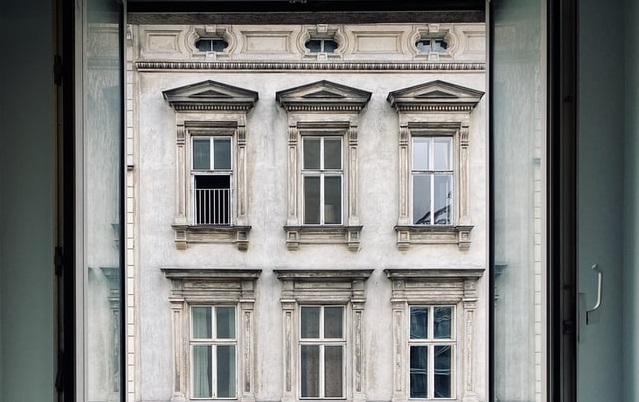The obvious difference between an Altbau and Neubau is their age. Under Austrian rental law, only buildings that pre-date 1953, specifically June 30th of that year, are considered Altbau.
You can often tell which category a building falls into just from the style.
If you’ve dreamed of living in a beautiful Viennese building with a huge front door and ornate flourishes in the staircase, the Altbau life may be for you. Altbau make up the majority of buildings in city and town centres around the country, with Neubau and particularly very new builds located more in the suburbs and on the outskirts.
Many Neubau are plainer to look at, but some of the more modern ones may come with extras like air conditioning, a roof terrace, or a gym.
READ ALSO: How to navigate the Austrian rental market
Heating and insulation
Speaking of air conditioning, the insulation and heating is one of the differences between Altbau and Neubau that’s likely to have a bigger impact on your quality of life.
The typical high ceilings of the Altbau create a nice atmosphere but can also be difficult to heat, while the older buildings are also less energy efficient.
This means that if you go down the Altbau route, you should check which renovations have been carried out, particularly on windows. A recently renovated and well-insulated Altbau means you could combine the ornate flourishes without having to choose between high heating bills and wearing three jumpers through the Austrian winter.
READ ALSO: The vocab you need to understand Austrian apartment ads
Neubau are more likely to be heated using central heating, which means you don’t need to carry out annual services on the gas boiler — par for the course with most Altbau and older Neubau, and usually at the tenant’s own expense (expect to pay somewhere between €75-150 for the service).
Within Neubau, there are differences depending on exactly how ‘new’ the building is, with those built in more recent decades most likely to have a high standard of soundproofing and insulation (and to have smarter floor plans and more modern perks like car parking), and those from the period between 1953 to the 1970s running the risk of the same issues as many old buildings. If you are renting an apartment in a brand new build, the energy efficiency and insulation will meet modern standards, but here there are extra considerations: new builds tend to experience cracks in the walls and other issues in their first few years while the building ‘settles’.
Rent, rights and operating costs
However, the biggest thing to be aware of is that the age of the building actually has quite a significant impact on your rights as a tenant.
Under Austria’s Tenancy Law (Mietrechtsgesetz or MRG – your contract will state whether this applies), there is a limit on how much rent can be charged per square metre, but only on an Altbau (again, note that this advantage may be wiped out if your additional costs are higher). These set costs vary by region and can also be affected by other factors such as quality of the furnishing. You are normally fully covered by the MRG if you are renting an Altbau, or in a few other specific situations, and this law grants you better protection against termination of the contract, and gives you rights around the amount of operating costs and maintenance of the apartment provided by the landlord for example.
READ ALSO: What we know so far about Austria’s planned rent cap
This doesn’t necessarily mean that renting a Neubau apartment immediately puts you at higher risk or gives you greater obligations. But it does mean that it’s extra important to pay attention to your contract, as some of your rights will be governed by the contract rather than the MRG and could be difficult to negotiate after the fact. For example, if renovations need to be carried out, you may need to go to court to enforce your rights. Depending on the type of apartment, you may be partially covered by the MRG or not at all.
And if you go for an Altbau, you still need to check the contract. The law might set out the amount legally allowed for rent, but tenants’ rights organisations frequently warn that many tenants are still significantly overcharged even in these buildings. The difference is that with an Altbau, you can take legal steps to reclaim money from an overpriced rental. Of course, it’s always better to make sure you’re paying the correct price from the start, and with an Altbau it’s easy to find out what that should be.
Overall, the age of the building is just one factor to weigh up along with the specific details of the individual properties you’re looking at: total price including rent and operating costs; quality of renovations; how much the style suits you; whether the landlord seems reasonable and responsive; and location.
Note that if you are buying rather than renting, the Neubau/Altbau classification brings a slightly different set of considerations. We are working on a guide looking at the differences buyers should be aware of.




 Please whitelist us to continue reading.
Please whitelist us to continue reading.
Member comments